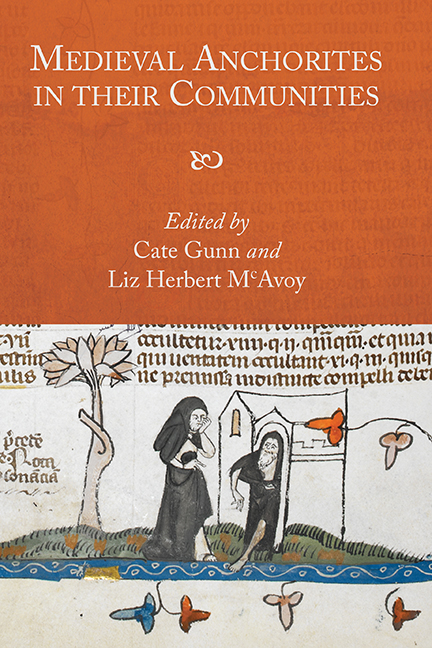Book contents
- Frontmatter
- Dedication
- Contents
- List of Illustrations
- Acknowledgements
- List of Contributors
- Abbreviations
- Introduction: ‘No Such Thing as Society?’ Solitude in Community
- 1 ‘O Sely Ankir!’
- Part I Religious Communities
- Part II Lay Communities
- Part III Textual Communities
- 10 Anchoritic Textual Communities and the Wooing Group Prayers
- 11 The Anchoress Transformed: On wel swuðe god ureisun of God almihti and þe wohunge of ure lauerd in the Fourteenth-Century A Talkyng of the Love of God
- 12 Ancrene Wisse and the Egerton Hours
- Bibliography
- Index
- Miscellaneous Endmatter
10 - Anchoritic Textual Communities and the Wooing Group Prayers
from Part III - Textual Communities
Published online by Cambridge University Press: 30 August 2017
- Frontmatter
- Dedication
- Contents
- List of Illustrations
- Acknowledgements
- List of Contributors
- Abbreviations
- Introduction: ‘No Such Thing as Society?’ Solitude in Community
- 1 ‘O Sely Ankir!’
- Part I Religious Communities
- Part II Lay Communities
- Part III Textual Communities
- 10 Anchoritic Textual Communities and the Wooing Group Prayers
- 11 The Anchoress Transformed: On wel swuðe god ureisun of God almihti and þe wohunge of ure lauerd in the Fourteenth-Century A Talkyng of the Love of God
- 12 Ancrene Wisse and the Egerton Hours
- Bibliography
- Index
- Miscellaneous Endmatter
Summary
IN the past thirty years, a great deal of scholarly work has opened up new vistas on the Ancrene Wisse Group, anchorites in general, and women's devotional literacies. Along with their appearance together in a number of manuscripts, the Ancrene Wisse Group of texts has long been accepted as having linguistic and thematic connections. The implications of these connections have been studied with reference to both context and audience, in particular the audience of anchoresses addressed in Ancrene Wisse itself both in its original and revised versions. In addition, the reading practices of medieval women have been illuminated by the work of a number of scholars. The results of these studies have provided a context in which we can now take what we know about early thirteenth-century anchoresses and their reading, combine it with what we know about other medieval women's literacies and habits, and make some informed speculations about the literary communities that are reflected in the composition of the Ancrene Wisse Group. In this chapter, I would like to indulge in such speculation, taking what we know about the Wooing Group prayers and their context and then pondering the question of ‘What then?’ along with a little ‘What if?’. I will focus on the four earliest prayers, found together as a group in London, British Library, MS Nero A. xiv (hereafter Nero).
Whether written specifically for anchoresses in the first instance or not, the texts of the Katherine Group and the Wooing Group became part of the gathering together of textual support for the anchoritic life of their female readers, possibly at the request of the anchoresses themselves, who needed prayers to supplement their devotions. The Wooing Group is a microcosm of this process: as I have argued elsewhere, when one considers the Wooing Group prayers in their historical and textual context, they become witnesses of the complexity of early thirteenth-century vernacular spirituality.
Wohunge is found only in London, British Library, MS Titus D. xviii (1240s) with Ancrene Wisse and three texts of the Katherine Group: Sawles Warde, Hali Meiðhad and Seinte Katerine. The four shorter Wooing Group prayers are found together in Nero (also dating to the 1240s): On god ureisun of ure lefdi; On wel swuðe god ureisun of God almihti; Þe oreisun of seinte Marie; and On lofsong of ure louerde.
- Type
- Chapter
- Information
- Medieval Anchorites in their Communities , pp. 167 - 182Publisher: Boydell & BrewerPrint publication year: 2017

